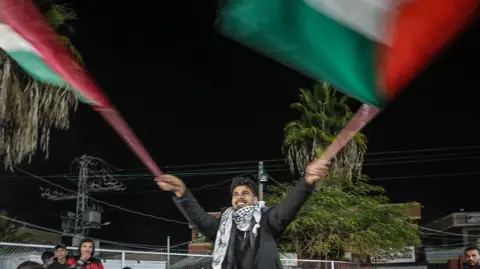Bowen: Long-overdue ceasefire may stop the killing but won't end the conflict
 EPA
EPAA senior Palestinian official told the BBC that Hamas would release three female soldiers on the first day of the ceasefire. Mediators in Doha are trying an earlier start to the ceasefire, Thursday evening instead of Sunday.
Until the ceasefire does come into effect, the war that started when Hamas attacked Israel on 7 October 2023 goes on. At least 12 Palestinians were killed by Israeli strikes on northern Gaza around the time the ceasefire was announced.
In what has been at times even an hourly ritual over the last 15 months, video has come out of northern Gaza showing their bodies being carried out of ambulances in sheets and laid out in a line outside a hospital.
The ceasefire is a considerable diplomatic achievement. It's long overdue. Versions of the deal have been on the table since it was announced by US President Joe Biden in May last year. Hamas and Israel have blamed each other for the delays.
In Khan Younis in Gaza, journalists working for the BBC filmed Palestinians dancing and chanting as it became clear that the ceasefire had been agreed.
Israel does not allow international journalists to enter Gaza to report freely, so the BBC and other news organisations rely on valiant Palestinian journalists to gather news for us. Reporting of the last 15 months of war would have been impossible without them. Israel has killed more than 200 Palestinian journalists in Gaza.
Umm Muhammad, an elderly Palestinian woman, told one of our journalists she felt happy and relieved.
"The pain has disappeared a bit, though it's still there. Hopefully it will be overcome by joy. Let our prisoners get freed and the injured get treated. People are exhausted."
Apart from survival there is not much to celebrate for Palestinians in Gaza. Israel has killed almost 50,000 people at least. More than two million people have been forced out of their homes by Israeli military action.
Israel's response to the Hamas attacks on 7 October 2023 that killed around 1200 people, mostly Israeli civilians, has left Gaza in ruins. According to the Hamas run health ministry, Israeli attacks have killed almost 50,000 people, both combatants and civilians. A recent study in the Lancet medical journal says that might be a major underestimate.
In Tel Aviv, it was also a bittersweet moment for the families and supporters of Israeli hostages, living and dead. In the first phase of the ceasefire, 33 women, older men and the sick and wounded are due for release in the next six weeks in return for hundreds of Palestinian detainees and prisoners – but the future of the rest of the hostages depends on more negotiations.
Negotiations on the second phase of the agreement, to free the remaining Israeli hostages in return for imprisoned Palestinians and an Israeli withdrawal from Gaza are due to start 16 days into the agreement.
The first big challenge is making sure that the ceasefire holds. Senior western diplomats fear that after the first phase of 42 days the war could resume.
The Gaza war has had immense consequences across the Middle East. It did not, as many feared, lead to a general war in the region – the Biden Administration has claimed credit for that – but it has led to geostrategic upheaval.
Hamas is still able to fight but it is a shadow of what it was. Israel's Prime Minister Benjamin Netanyahu and his former defence minister have been accused of war crimes by the International Criminal Court. The International Court of Justice is investigating a case brought by South Africa accusing Israel of genocide.
After Hezbollah in Lebanon intervened in the war, it was, eventually, crushed by an Israeli offensive. That was a factor that led to the collapse of the Assad regime in Syria. Iran and Israel exchanged direct attacks – weakening Iran. Its network of allies and proxies that Tehran called the Axis of Resistance has been crippled.
The Houthis in Yemen have halted much of the shipping between Europe and Asia that passes the Red Sea. Now reports say that they have announced their own ceasefire. Since they started attacking shipping early in the war they have said that only a ceasefire in Gaza would stop them.
With luck, political will and hard diplomatic effort the ceasefire will hold despite inevitable violations. With luck, it can stop the killing and get Israeli hostages and Palestinian detainees and prisoners back to their families.
But after 15 months of war in Gaza, the conflict which has lasted more than a century is as bitter and intractable as ever.
The ceasefire doesn't end the conflict. The consequences of so much destruction and death will be felt for a generation, at least.
